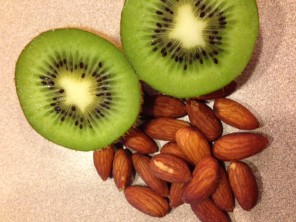What Can A Snack Do For You?
A SNACK is defined as a small meal; prepared or easy-to-prepare food eaten between main meals.
It is a “mini meal”, a chance to give your body a boost of energy, important nutrients, and keep you satisfied between meals.
Health Care Providers are recommending 5-6 small meals a day or 3 small meals and 2 nutritious snacks a day to promote a healthy body weight and help improve symptoms and conditions such as heartburn, diabetes, gastroparesis, excess gas and bloating, etc. There are snacks that can help and snacks that can worsen these and other health conditions and symptoms.
A nutritious and satisfying snack is one that has a balance of complex carbohydrates, lean protein, and healthy fat and is a good source of fiber, water, and vitamins and minerals. Try combining 2 foods to achieve this balance. The GREAT NEWS is that your snack should also be one that you enjoy, so it can include sweet and/or salty flavors and a variety of textures! See some ideas below.
What can a nutritious and satisfying snack do for you?
- Help control your hunger between meals, preventing overeating at the next meal
- Keep your hunger satisfied throughout the day, decreasing excess cravings for sweets or salty high fat foods
- Provide fiber and water, helping you achieve maintain a strong digestive system
- Help keep your blood sugars, blood pressure, and/or cholesterol within healthy ranges
- Provide you with the energy your body needs to perform and function at its best
- Promote a healthy body weight
What can a high sugar/sodium and high calorie snack do for you?
- Increase your hunger and cravings for more high sugar/sodium and high calorie foods throughout the day
- Cause your blood sugars, blood pressure, and/or cholesterol to rise too high
- Lead to weight gain
- Make you feel sluggish and tired throughout the day
- Cause gastrointestinal discomfort and unwanted side effects
Nutritious Satisfying Snacks Between 100-200 Calories:
| Sweet | Salty | Sweet and Salty |
|---|---|---|
| 6oz. low-fat Greek yogurt with ½ cup fresh fruit | 1 hard-boiled egg with 6 whole grain crackers | Apple slices or celery sticks with 1 Tbsp. peanut butter |
| ½ cup vanilla kefir blended with ½ banana and 1 Tbsp. chocolate peanut butter powder | 1 string cheese wrapped in a 6in. whole grain tortilla | ½ cup cottage cheese with pineapple or tomato slices |
| 1 square dark chocolate with 2 mandarin oranges | 2oz. low sodium deli meat on 1 slice whole wheat bread | ¼ cup dried fruit and nut mix |
| 12oz. Chocolate milk or milk alternative such as soy milk | Baby carrots or cucumber slices with 2 Tbsp. hummus | Granola bar with <8gm sugar or no added sugars and >4gm fiber/bar |
Be aware of calorie dense, low nutrient “snacks”:
- Soda (24oz. Mt Dew = 340 calories)
- Juice (16oz. fruit juice = 260 calories)
- Sweet tea (32oz. sweet tea = 280 calories)
- Sweetened coffee (small frappe mocha = 450 calories)
- Cookie (Fast food chocolate chip cookie = 440 calories)
- Muffins and other pastries (blueberry muffin = 440 calories)
- Chips (Doritos snack bag = 240 calories)
- Fried foods (medium French fries = 380 calories)
- Candy (Snickers bar = 250 calories)
- High sugar, low fiber cereal, granola bars, granola (1 pkg. pop tarts = 420 calories
Snacking should be enjoyable and make you feel good. If your snacks are doing this for you, great, keep it up! If not, try some of the nutritious snack ideas above.
Next Steps:
Plan set times for your 1-2 daily snacks, get to the store and stock up on your favorite nutritious items, pre-portion if needed and keep where you will utilize them, and then observe what your snacks can do for you!

